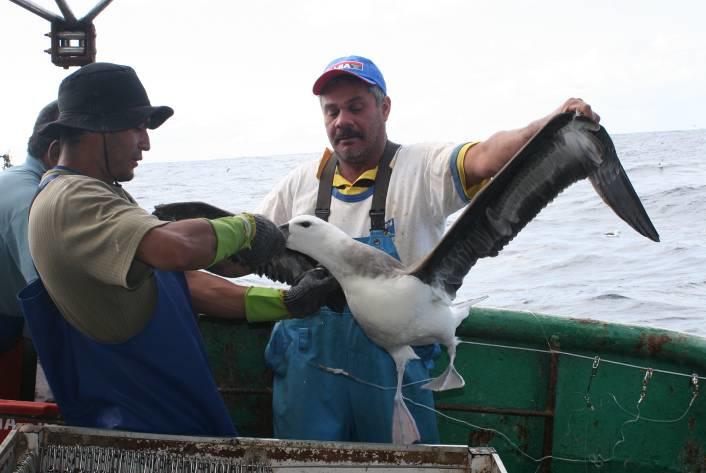Tatiana Neves
Our main goals are the implementation of mitigation measures in longline vessels in southeastern Brazil to reduce the seabirds incidental captures during fishing operations. This work is made with observers on board who also inform the fishermen about the importance of marine ecosystem preservation, focusing albatrosses and petrels.

This fleet is composed by 20 vessels which are already monitored by Projeto Albatroz, and with this project we expect introduce the mitigation measures in at least 4 vessels from the longline fishery fleet in Southern Brazil. The main goals are implementing mitigation measures and monitoring the seabird bycatch. Environmental educational programs addressed to the fishermen will be implemented in order to inform them about the importance of marine ecosystem preservation, with special attention on the albatrosses and petrels.
It will be also emphasized that bycatch of seabirds is, for one side, a waste of money, especially for the fishing industry and an environmental problem considering the decreasing of seabird populations around the world what is becoming a critical issue. The landings in fisheries ports at Santos and Itajaí cities will be monitored on a weekly basis, through informal conversations with the skippers and crewmembers in order to increase the link between the fishermen and Projeto Albatroz, promoting the reduction of the seabird’s incidental bycatch caused by the longline vessels. To test these measures, the project will offer the necessary materials (torilines and blue dye) for the longline vessels, and advise them through an observer on board from the Projeto Albatroz staff.
The long-term conservation consequences of this project are the implementation of measure to avoid seabirds bycatch on the fishing routine, adapting them to the Brazilian longline fleet. The tests’ results will provide reliable information relevant to the federal act, that will ultimately make mandatory the use of mitigation measures by all longliners in different fisheries, as well as provide adequate characteristics of equipment and methods for the ICCAT-International Commission for the Conservation of Atlantic Tuna, which is trying to specify the equipment to be used for country members to avoid the incidental capture of seabirds in the whole Atlantic Ocean.
Moreover, making the fishing industry aware of seabird bycatch, how it affects seabird populations and the economics of their operation is fundamental to the sustainability of the industry. It is essential to evaluate the periods before and after the implementation of mitigation measures in southern Brazil and the seabird bycatch in vessels that adopted and did not adopt mitigation. All the goals of this project are presented in the National Plan of Action for Conservation of Albatrosses and Petrels, launched by the Brazilian government in June 2006 .The results of such project will be very important for the long-term establishment of effective mitigation measures in the area.